Standard Treatment Resistance Discovered in Crohn's Disease
Researchers have mapped out more than 100,000 immune cells from biopsy samples of patients with Crohn's disease. The biopsy samples were retrieved from regions of inflamed and uninflamed Crohn's disease lesions on small intestine tissue and the analysis indicated a signature of cells implicated in the disease that does not respond to treatment. The discovery provides new clues to how we approach novel therapeutic options—findings were published in Cell.
Learn more about Crohn’s Disease:
"We designed this study in a way that defines inflammation with unprecedented precision using immunology and computational biology to get a better understanding of this disease," said co- corresponding author Judy H. Cho, MD, Senior Associate Dean for Precision Medicine, Director of The Charles Bronfman Institute for Personalized Medicine, Ward-Coleman Professor of Translational Genetics, and Professor of Medicine, and Genetics and Genomic Sciences, at the Icahn School of Medicine. "These results emphasize the limitations of current diagnostic assays and the potential for single-cell mapping tools to identify novel biomarkers for treatment response and tailored therapeutic opportunities."
After using techniques such as single-cell RNA sequencing and CyTOF technology, researchers identified for the first time a precise cell type resistant to the standard therapy for Crohn's disease, an anti-inflammatory drug called a TNF inhibitor. The drug is a major agent delivered to patients with moderate to severe Crohn's disease, however, roughly 40 percent of these patients taking the inhibitor do not respond to the therapy.
"Single-cell profiling could transform drug discovery," said co-corresponding author Miriam Merad, MD, PhD, Director of the Precision Immunology Institute at the Icahn School of Medicine at Mount Sinai, Mount Sinai Professor in Cancer Immunology, Co-Director of the Cancer Immunology Program at The Tisch Cancer Institute and Director of the Mount Sinai Human Immune Monitoring Center. "It's really going to give us much more clarity into inflammatory bowel disease and why patients are resisting and what else we could be targeting."
Discovering a signature of cells can help identify patients who fail on this therapeutic inhibitor and avoid surgical complications. The study has allowed researchers to explore new ways of developing diagnostic methods that can determine such signature through a simple blood test. If such a diagnostic method is developed, doctors can prescribe other medicines besides a TNF inhibitor that will work well for their patients.
"Our study shows that approaches that combine high-resolution single-cell mapping of inflammatory lesions in small numbers of patients with bulk RNA sequencing on large cohorts with extensive clinical characterization leads to generalizable insights, highlighting the potential to broadly transform understanding of human multifactorial immune-mediated inflammatory diseases," said co-corresponding author Ephraim Kenigsberg, PhD, Assistant Professor of Genetics and Genomic Sciences at the Icahn Institute for Data Science and Genomic Technology.
Source: Science Daily
-
APR 30, 2024Immuno-Oncology Virtual Event Series 2024
-
MAY 07, 20243rd International Biosecurity Virtual Symposium
-
JUN 06, 2024The Future of Scientific Conferencing
- See More


















































